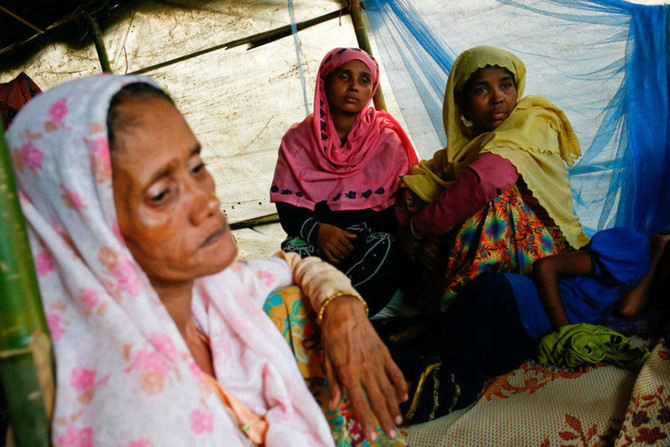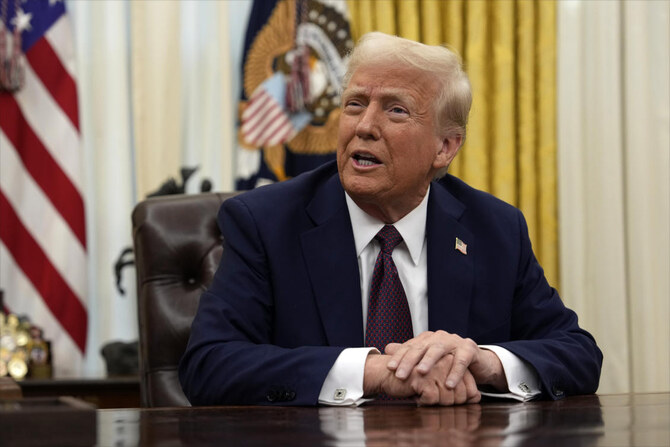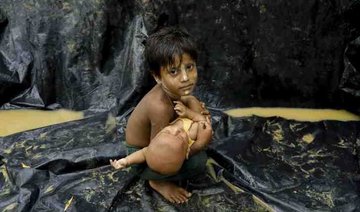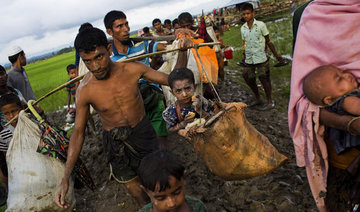KUTAPALONG, Bangladesh: The villagers said the soldiers came first, firing indiscriminately. Then came civilians, accompanying the soldiers, to loot and burn.
Now in Bangladesh, 20 Muslims and Hindus gave interviews in which they recounted how they were forced out of their village of Kha Maung Seik in Myanmar’s Rakhine State on Aug. 25.
“The military brought some Rakhine Buddhists with them and torched the village,” said Kadil Hussein, 55.
“All the Muslims in our village, about 10,000, fled. Some were killed by gunshots, the rest came here. There’s not a single person left.”
Hussein is staying with hundreds of other new arrivals at the Kutapalong refugee settlement, already home to thousands of Rohingya who fled earlier.
Nearly 150,000 Rohingya have arrived in Bangladesh since Aug. 25, when insurgents of the Arakan Rohingya Salvation Army launched attacks on security forces in Rakhine State.
Reuters interviewed villagers from Kha Maung Seik and neighboring hamlets, who described killings and the burning of homes in the military response to the insurgent attacks.
Reuters has been unable to verify their accounts. Access to the area has been restricted since October, when the same insurgent group attacked police posts, killing nine.
Myanmar says its forces are in a fight against “terrorists.” State media has accused Rohingya militants of burning villages and killing civilians of all religions.
Myanmar does recognize the 1.1 million Rohingya as citizens, labelling them illegal immigrants from Bangladesh.
The refugees from Kha Maung Seik, and from numerous other villages across the north of Rakhine State, say Myanmar forces and ethnic Rakhine Buddhists are intent on forcing them out.
One refugee, Body Alom, 28, said he hid in forest with thousands of others when the soldiers arrived. He waited for hours before emerging to look for his family.
He says he saw corpses in paddy fields, and eventually found his mother and brother dead with gunshot wounds. Two other villagers said they saw bodies in the fields.
“It wasn’t safe, so I just left them,” he said. “I had no chance to give them a burial.”
TENSE MIX
A military official denied that Buddhist civilians were working with authorities and instead accused Muslims of attacking other communities.
“The military arrived at the village later but did not find any bodies,” said the military source, who declined to be identified as he is not authorized to speak to media.
Another military source in the state capital, Sittwe, said Kha Maung Seik was in the conflict zone and clear information about what happened had yet to emerge.
The main village of Kha Maung Seik was home to a mixed community, with Rohingya Muslims in the majority along with about 6,000 Rakhine Buddhists, Hindus and others.
The village is known to the Rohingya as Foira Bazar for its market of about 1,000 shops where everyone did business.
But relations have been strained for some time.
A government plan to grant Hindus citizenship, violence in the state in 2012 and October, and an identity card scheme that the Rohingya rejected as it implied they were foreign, all contributed to tension, the refugees said.
Since October, more soldiers were posted near the village, with border police. Patrols went house-to-house arresting anyone suspected of having militant links, they said.
Abu Kalam, 31, showed Reuters welts on his back, arms and legs, and what he said were cigarette burns on his arms. He said he was detained by the military last month, before the attacks, as he was working in his vegetable patch with a knife.
“After October, the military told us not to have knives. When they saw me using one they arrested me,” he said, adding he was kept in a barracks for six days.
“They regularly tortured me, asking ‘are you connected with Al-Yaqin?’,” he said, using another name for the rebels.
INDISCRIMINATE FIRING
Villagers in Kha Maung Seik say they heard shooting at 2 a.m. on Aug. 25. A military source in Maungdaw town and two Muslim residents said militants attacked a police post near the village that night.
According to the military source, the rebels attacked with grenades then turned their attention to a Hindu neighborhood.
Four Rohingya villagers separately gave Reuters accounts of how, at about 5 a.m., soldiers entered the village, firing indiscriminately. Thousands fled.
“I was at the front of a big group running for cover, but I looked back and could see people at the back getting shot,” said Abul Hussein, 28.
Later, grenades and mortar bombs were fired into the forest, according to Hussein and three other villagers.
“I saw a mortar hit a group of people. Some died on the spot,” he said.
From the forest, residents watched military and civilians loot and burn houses. Civilians helped gather bodies, according to Body Alom and two other villagers.
“They collected the bodies, searching for belongings,” said Body Alom. “They took money, clothes, cows, everything. Then they burned the houses.”
Members of Myanmar’s small Hindu community seem to have been caught in the middle. The military source said some Hindus from Kha Maung Seik were unaccounted after the militant attack.
A group of Hindu women refugees in Kutapalong said they saw eight Hindu men killed by Buddhist Rakhines after they refused to attack Muslims.
“They asked my husband to join them to kill Rohingya but he refused, so they killed him,” said Anika Bala, 15. Six months pregnant, she said Muslims helped her get to Bangladesh.
After seeing their homes burned, Kha Maung Seik’s Muslim leaders decided it was too dangerous to stay.
“We thought we might be able to return and live with other types of people,” said Mohammed Zubair, 30, assistant to the village chairman.
“But we realized that’s not possible.”
About 100 men decided to stay and fight, Body Alom said.
“One said to me ‘If I have to die, I will die here’.”
Rohingya say their village is lost to Myanmar’s spiralling conflict
Rohingya say their village is lost to Myanmar’s spiralling conflict

University students lead a strike in Serbia as populist president plans a rally to counter protests

- Daily traffic blockades took place on Friday in various cities and towns in the Balkan nation
- “Let’s take freedom in our hands,” students told the citizens in their strike call
BELGRADE: A student-led strike closed down numerous businesses and drew tens of thousands into the streets throughout Serbia on Friday as populist President Aleksandar Vucic planned a big rally to counter persistent anti-government protests that have challenged his tight grip on power.
Daily traffic blockades took place on Friday in various cities and towns in the Balkan nation, held to commemorate the victims of a deadly canopy collapse which killed 15 people in November. Huge crowds later flooded the streets for noisy protest marches through the capital Belgrade and elsewhere in the country.
“Let’s take freedom in our hands,” students told the citizens in their strike call.
Many in Serbia believe the huge concrete canopy at a train station in the northern city of Novi Sad fell down because of sloppy reconstruction work that resulted from corruption.
Weeks-long protests demanding accountability over the crash have been the biggest since Vucic came to power more than a decade ago. He has faced accusations of curbing democratic freedoms despite formally seeking European Union membership for Serbia.
It was not immediately possible to determine how many people and companies joined the students’ call for a one-day general strike on Friday. They included restaurants, bars, theaters, bakeries, various shops and bookstores.
Vucic will gather his supporters in the central town of Jagodina later on Friday. He has announced plans to form a nationwide political movement in the style of Russia’s President Vladimir Putin that would help ensure the dominance of his right-wing Serbian Progressive Party.
The president and his mainstream media have accused the students of working under orders from foreign intelligence services to overthrow the authorities while pro-government thugs have repeatedly attacked protesting citizens.
No incidents were reported during the 15-minute traffic blockades on Friday that started at 11.52, the exact time of the canopy collapse in Novi Sad.
During a blockade last week in Belgrade, a car rammed into protesting students, seriously injuring a young woman.
Serbian universities have been blockaded for two months, along with many schools. A lawyers’ association also has gone on strike but it remained unclear how many people stayed away from work in the state-run institutions on Friday.
As well as Belgrade and Novi Sad, protest marches were also held Friday in the southern city of Nis and smaller cities, and even in Jagodina ahead of Vucic’s arrival.
“Things can’t stay the same anymore,” actor Goran Susljik told N1 regional television. “Students have offered us a possibility for a change.”
Serbia’s prosecutors have filed charges against 13 people for the canopy collapse, including a government minister and several state officials. But the former construction minister Goran Vesic has been released from detention, fueling doubts over the probe’s independence.
The main railway station in Novi Sad was renovated twice in recent years as part of a wider infrastructure deal with Chinese state companies.
Ukraine to evacuate more children from frontline villages

- “I have decided to start a mandatory evacuation of families with children” from around two dozen frontline villages and settlements, Donetsk region governor Vadym Filashkin said
- Around 110 children lived in the area affected
KYIV: Ukraine on Friday announced the mandatory evacuation of dozens of families with children from frontline villages in the eastern Donetsk region.
Russia’s troops have been grinding across the region in recent months, capturing a string of settlements, most of them completely destroyed in the fighting since Russia invaded in February 2022.
“I have decided to start a mandatory evacuation of families with children” from around two dozen frontline villages and settlements, Donetsk region governor Vadym Filashkin said on Telegram.
Around 110 children lived in the area affected, he added.
“Children should live in peace and tranquility, not hide from shelling,” he said, urging parents to heed the order to leave.
The area is in the west of the Donetsk region, close to the internal border with Ukraine’s Dnipropretovsk region.
Russia in 2022 claimed to have annexed the Donetsk region, but has not asserted a formal claim to Dnipropretovsk.
The order to leave comes a day after officials in the northeastern Kharkiv region announced the evacuation of 267 children from several settlements there under threat of Russian attack.
Trump to visit disaster zones in North Carolina, California on first trip of second term

- The president is also heading to hurricane-battered western North Carolina
WASHINGTON: President Donald Trump is heading into the fifth day of his second term in office, striving to remake the traditional boundaries of Washington by asserting unprecedented executive power.
The president is also heading to hurricane-battered western North Carolina and wildfire-ravaged Los Angeles, using the first trip of his second administration to tour areas where politics has clouded the response to deadly disasters.
Kyiv says received bodies of 757 killed Ukrainian troops

- The exchange of prisoners and return of their remains is one of the few areas of cooperation between Moscow and Kyiv
KYIV: Kyiv said Friday it had received the bodies of hundreds of Ukrainian troops killed in battle with Russian forces, in one of the largest repatriations since Russia invaded.
The exchange of prisoners and return of their remains is one of the few areas of cooperation between Moscow and Kyiv since the Kremlin mobilized its army in Ukraine in February 2022.
The repatriation announced by the Coordination Headquarters for the Treatment of Prisoners of War, a Ukrainian state agency, is the largest in months and underscores the high cost and intensity of fighting ahead of the war’s three-year anniversary.
“The bodies of 757 fallen defenders were returned to Ukraine,” the Coordination Headquarters said in a post on social media.
It specified that 451 of the bodies were returned from the “Donetsk direction,” probably a reference to the battle for the mining and transport hub of Pokrovsk.
The city that once had around 60,000 residents has been devastated by months of Russian bombardments and is the Kremlin’s top military priority at the moment.
The statement also said 34 dead were returned from morgues inside Russia, where Kyiv last August mounted a shock offensive into Russia’s western Kursk region.
Friday’s repatriation is at least the fifth involving 500 or more Ukrainian bodies since October.
Military death tolls are state secrets both in Russia and Ukraine but Ukrainian President Volodymyr Zelensky revealed last December that 43,000 Ukrainian troops had been killed and 370,000 had been wounded since 2022.
The total number is likely to be significantly higher.
Russia does not announce the return of its bodies or give up-to-date information on the numbers of its troops killed fighting in Ukraine.
EU says it is ready to ease sanctions on Syria

- The top EU diplomat said the EU would start by easing sanctions that are necessary to rebuild the country
ANKARA: The European Union’s foreign policy chief said the 27-member bloc is ready to ease sanctions on Syria, but added the move would be a gradual one contingent on the transitional Syrian government’s actions.
Speaking during a joint news conference in Ankara with Turkiye’s foreign minister on Friday, Kaja Kallas also said the EU was considering introducing a “fallback mechanism” that would allow it to reimpose sanctions if the situation in Syria worsens.
“If we see the steps of the Syrian leadership going to the right direction, then we are also willing to ease next level of sanctions,” she said. “We also want to have a fallback mechanism. If we see that the developments are going to the wrong direction, we are also putting the sanctions back.”
The top EU diplomat said the EU would start by easing sanctions that are necessary to rebuild the country that has been battered by more than a decade of civil war.
The plan to ease sanctions on Syria would be discussed at a EU foreign ministers meeting on Monday, Kallas said.


















